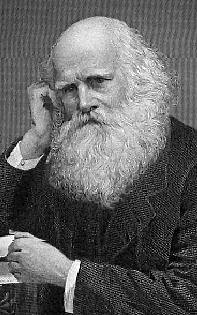William Cullen Bryant (William Cullen Bryant)

“Thanatopsis” is William Cullen Bryant’s most famous poem, which Bryant may have been working on as early as 1811. In 1817 his father took some pages of verse from his son’s desk, and at the invitation of Willard Phillips, an editor of the North American Review who had previously been tutored in the classics by Dr. Bryant, he submitted them along with his own work. The editor of the Review, Edward Tyrrel Channing, read the poem to his assistant, Richard Henry Dana, who immediately exclaimed, “That was never written on this side of the water!”[5] Someone at the North American joined two of the son’s discrete fragments, gave the result the Greek-derived title Thanatopsis (“meditation on death”), mistakenly attributed it to the father, and published it. After clarification of the authorship, the son’s poems began appearing with some regularity in the “[Review]”. “To a Waterfowl”, published in 1821 was the most popular. On January 11, 1821, William Bryant, still striving to build a legal career, married Frances Fairchild. Soon after, having received an invitation to address the Harvard University Phi Beta Kappa Society at the school’s August commencement, Bryant spent months working on “The Ages”, a panorama in verse of the history of civilization, culminating in the establishment of the United States. As it would in all collections he subsequently issued, “The Ages” led the volume, also entitled Poems, which he arranged to publish on the same trip to Cambridge. For that book, he added sets of lines at the beginning and end of “Thanatopsis” that changed the poem. His career as a poet was now established, though recognition as America’s leading poet waited until 1832, when an expanded Poems was published in the U.S. and, with the assistance of Washington Irving, in Britain. His poetry has been described as being “of a thoughtful, meditative character, and makes but slight appeal to the mass of readers.”
In his last decade, William Bryant shifted from writing his own poetry to a blank verse translation of Homer’s works. He assiduously worked on the Iliad and The Odyssey from 1871 to 1874. He is also remembered as one of the principal authorities on homeopathy and as a hymnist for the Unitarian Church — both legacies of his father’s enormous influence on him. William Cullen Bryant died in 1878 of complications from an accidental fall suffered after participating in a Central Park ceremony honoring Italian patriot Giuseppe Mazzini. He is buried at Roslyn Cemetery in Roslyn, Long Island, New York.
Born
- November, 03, 1794
- USA
- Cummington, Massachusetts
Died
- June, 06, 1878
- USA
- New York, New York
Cause of Death
- accidental fall
Cemetery
- Roslyn Cemetery
- Roslyn, New York
- USA



